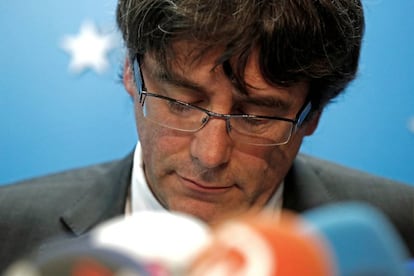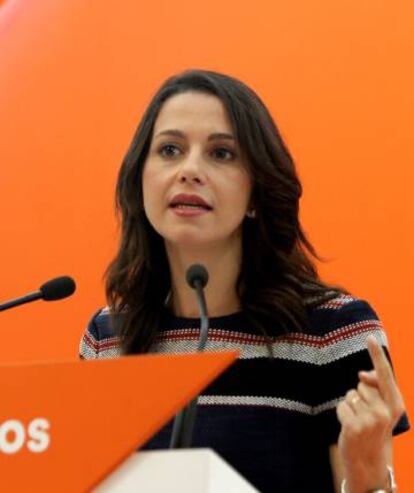Catalan separatists accept new election as “plebiscite” on Article 155
Ciudadanos unsuccessful at crafting preliminary deal bringing together unionist parties in the region

Carles Puigdemont, the sacked Catalan premier, has accepted the regional election called by the Spanish Prime Minister for December 21.
“We accept these elections as a democratic challenge (…) If the Spanish state wants to organize a plebiscite to legitimize (the application of) Article 155 and its policies, we will accept it and respond to it,” said Puigdemont on Tuesday in Brussels, where he had secretly traveled a day earlier with five members of his cabinet.
We need to achieve a referendum that’s agreed on and recognized by the state and by international institutions
Santi Vila, PDeCAT candidate
The ousted premier said he intends to stay there until he has “guarantees of a fair trial” back in Spain, where he could face charges of sedition and rebellion for the unilateral declaration of independence that was voted by separatist deputies in the Catalan assembly last Friday.
In a widely followed news conference, Puigdemont said he wanted this election to become a gauge of Catalan support for Madrid’s takeover of Catalan self-government. He was alluding to the emergency powers activated by invoking Article 155 of the Spanish Constitution, aimed at restoring the law in breakaway regions. This provision had not been used since Spain transitioned to democracy in the late 1970s.

Meanwhile, Ciudadanos is asking for a deal among unionist parties so that if they achieve more seats than the separatists, the most-voted one among them should get to head the government. So far, however, the Catalan Socialists (PSC) and the Popular Party (PP) conservatives are ruling out any pre-election agreements.
“If we are able to add our strengths together, constitutionalism can beat nationalism,” said Ciudadanos leader Inés Arrimadas following a meeting of the party’s executive leadership. “It will be practically indispensable to reach a cross-party agreement after the election. I would like for there to be a preliminary agreement.”
A U-turn
In the three days since 70 separatist deputies in the 135-seat assembly approved a text paving the way for a Catalan republic, the pro-independence movement has made a rhetorical U-turn. After openly rejecting the Spanish Constitution and the takeover of regional powers by Madrid, separatist parties are now embracing an election called by the Spanish head of government under Article 155, and to be held within Spain’s constitutional framework.
Faced with the fact that the Catalan republic has attracted no international recognition, that businesses are fleeing the region, that public officials are not resisting control from Madrid, and that no alternative state structures exist – Mireia Boya, a deputy for the far-left CUP, admitted on Tuesday that “we see now that not everything was ready” – separatist parties considered their options.
We see now that not everything was ready
CUP deputy Mireia Boya
Puigdemont’s own Catalan European Democratic Party (PDeCAT) and the Catalan Republican Left (ERC), the two leading members of the Junts pel Si coalition that have governed Catalonia since the 2015 election, have decided to run in the new election. The anti-capitalist CUP first announced that it would boycott the vote, then revised its position.
Possible outcomes
A poll conducted by the Catalan statistics bureau Centre d’Estudis de Opinió de la Generalitat (CEO) suggests that if Junts pel Si coalition ran again, it woud secure between 60 and 63 seats, similar to the 62 it earned in 2015. The non-nationalist party Ciudadanos would come in second with 25 to 26 deputies, followed by the Catalan Socialist Party (17-19), SíQueEsPot (12-14), the Popular Party (10-11) and CUP (8-9).
This would mean 68 seats for all secessionist forces put together, just barely enough to hold on to its majority in the 135-seat chamber. As a percentage of votes, however, they would represent 45.9% compared with 50.9% for non-nationalist forces.
Candidates are already starting to step up to the plate. Santi Vila, a former member of Puigdemont’s cabinet, said that he would run with the PDeCAT to “give a voice to moderation.”
Vila, who served as head of the business department in the Catalan government, resigned right after Puigdemont failed to call elections himself, as he had been expected to do last Thursday. “I have the team, the support and the determination. Independence from a position of moderation, that would be the idea,” he told the radio station RAC1.
He added that Puigdemont’s trip to Brussels “was a surprise to me and for the party leadership.”
As head of the business department, Vila created a crisis cabinet to keep close tabs on the effects of the independence drive on the Catalan economy, including the mass departure of businesses from the region due to fears of legal and political instability.
“Now it is time to reprogram how we are going to head towards these elections. I think we need to base this on three ideas: the defense of Catalan institutions, amnesty – Rajoy must instruct prosecutors to let politicians do politics – and readjust ourselves in order to achieve a referendum that’s agreed on and recognized by the state and by international institutions,” he said, alluding to an October 1 referendum that was held without legal guarantees, but which Puigdemont claims is a “popular mandate” for independence.
English version by Susana Urra.
Tu suscripción se está usando en otro dispositivo
¿Quieres añadir otro usuario a tu suscripción?
Si continúas leyendo en este dispositivo, no se podrá leer en el otro.
FlechaTu suscripción se está usando en otro dispositivo y solo puedes acceder a EL PAÍS desde un dispositivo a la vez.
Si quieres compartir tu cuenta, cambia tu suscripción a la modalidad Premium, así podrás añadir otro usuario. Cada uno accederá con su propia cuenta de email, lo que os permitirá personalizar vuestra experiencia en EL PAÍS.
¿Tienes una suscripción de empresa? Accede aquí para contratar más cuentas.
En el caso de no saber quién está usando tu cuenta, te recomendamos cambiar tu contraseña aquí.
Si decides continuar compartiendo tu cuenta, este mensaje se mostrará en tu dispositivo y en el de la otra persona que está usando tu cuenta de forma indefinida, afectando a tu experiencia de lectura. Puedes consultar aquí los términos y condiciones de la suscripción digital.








































